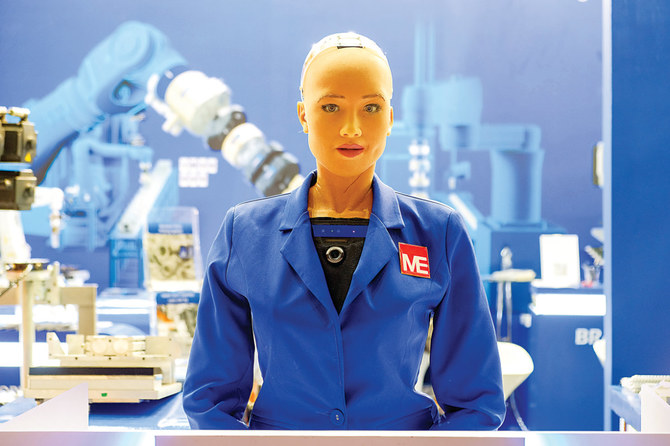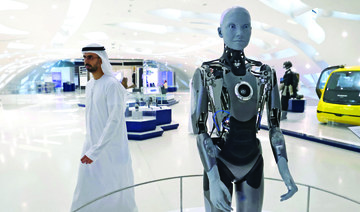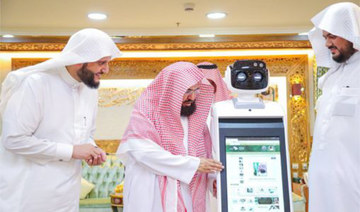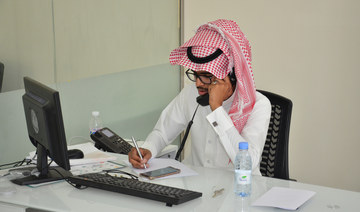CAIRO: Saudi Arabia’s artificial intelligence and robotics sector is set to contribute over $135.2 billion, equivalent to 12.4 percent of the country’s gross domestic product by 2030, according to PricewaterhouseCoopers.
The world is entering a phase where automation is taking over the traditional ways of business, and the Kingdom has also been pulling out huge initiatives to support the implementation of robotics into its economy.
The average annual growth of AI and automation contribution to the Kingdom is expected to reach 31 percent each year from 2018 to 2030.
Ahmed Baharoon, AI consultant and co-founder of Inc Robotics, a Saudi-based robotics provider, told Arab News that the Kingdom is supporting the adoption of robotics across industries. However, the challenges in automating their operations persist.
“The government is driving initiatives such as the automation of 4,000 manufacturing plants within the next five years, and the Kingdom’s logistical strategy launched last year lists the use of robotics and AI in smart cities, including NEOM and The Line,” Baharoon said.
He highlighted that robotics could significantly reduce costs in many sectors and utilize human labor for better purposes.
“That contributes to smooth customer service, a positive image for the company and better employee experience. Having a robot can enhance the customer experience and create great moments that can be used to enhance brands and present them in a fun way,” he added.
The advantages of automation and robotics are only present when companies are willing to take the risk of abandoning traditional ways and paying more now to reduce costs in the future.
Baharoon added that robotics companies in the Kingdom need to start educating businesses about the benefit of automation to reduce costs and encourage a leap into AI.
“Companies look for guidance to ensure their investment is not going to be in vain,” he said, adding that robotic providers need to understand the automation process and develop a comprehensive cost-benefit analysis for their clients.
He stated that the future of the business would revolve around robotics, much like mobile phones and the internet which were once perceived as luxury items until they became a general necessity.
The apprehension of robotics does not concern only large companies. Baharoon states that even startups in the Kingdom should take the risk and present automation ideas to gain investment interest rather than thinking they are ahead of their time.
“Startups in the Kingdom present some of the most innovative solutions in the region. However, many of them do not like to present bold ideas out of fear that they would not get funded,” he added.
Baharoon advised small and medium enterprises to start introducing innovative automation solutions aligned with the government’s interest in investing in the future of the industry.
Saudi-based venture capital firms are already showing interest in the robotics industry as Aramco’s investment subsidiary Prosperity7 recently invested $150 million into Chinese startup Jaka Robotics. The Kingdom has also seen Saudi Excellence Co. partner with US-based robotics company Nala Robotics to establish the country’s first AI-powered robotic cloud kitchen.
Research Products Development Co., owned by the Public Investment Fund, is also adopting robotic solutions to enhance its offshore oil operations. The company aims to launch a robot to inspect pipeline leaks under the water and is working with Saudi Arabian Oil Co. to develop a prototype by the end of 2022.
The Kingdom’s interest in robotics is also rising, with large cooperations investing in automation and AI as part of their operations. The market is set to increase rapidly in the next few years.
According to a report by PwC, the Middle East could attract up to $125 billion investments in robotics by 2025, specializing in manufacturing technology hardware solutions.
“We estimate that the market for industrial and service robots in the region could reach $4 billion by 2025 and that industrial internet of things devices could reach $1.5 billion. As a result, competition among countries to stake claims on tech segments, gain first-mover advantage and attract global tech companies looking to establish a regional foothold will be fierce,” the report stated.
Moreover, the UAE has already started to support entrepreneurs in developing robots with its newly launched Dubai Robotics and Automation Program led by Sheikh Hamdan bin Mohammed, the crown prince of Dubai.
The program, launched on Sept. 21, will provide over 200,000 robots to raise efficiency and productivity levels in multiple sectors and create a futuristic competitive economy.
Major international companies are also heading to Saudi Arabia to invest in robotics and AI as the Kingdom aims to establish 400 startups in the field, Asharq Al-Awsat reported.
Robotics investments are expected to surpass $150 million in the next two years, with the development of smart cities and digitalization rising in the Kingdom.





























